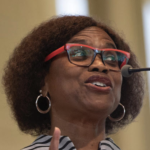
There are various levels of listening, and what’s needed here is what MLK preached about.
Many white Americans have asked me, Is the civil unrest Americans still see across the country, against anti-Black violence, police brutality, and demanding systemic change, a movement?
Or is it likely to die out in a couple of months?
I reply, It depends if you get involved, how you get involved, and if you can listen as an ally.
For example, participants in Portland’s Wall of Moms initially thought they were responding to the George Floyd protests as allies. Their primary goal, however, was to get federal officers out of the city, and their chants said it all: “Feds stay clear, moms are here,” and, “Feds go home!”
Now, these moms have been called out by Black community leaders in Portland for helping divert attention away from the Black Lives Matter movement. The president of the Portland NAACP depicted their involvement and that of many other comparable protesters as “a largely white spectacle,” as WOM is accused of excluding Black moms, disregarding the safety of Black protesters, and co-opting the protests for its agenda.
In one example of co-option, the unclothed white woman and performative activist who goes by the name Naked Athena won accolades for flashing federal officers as a brave and bold ally of the cause. As Lakayana Drury, executive director of Word is Bond, a Portland-based nonprofit, told the Washington Post, “What’s happening downtown is not a Black issue.”
To improve our democracy, we need to listen to each other. As Martin Luther King Jr. said in his 1967 speech, “The Other America,” at Stanford University, “A riot is the language of the unheard.” As 159 race riots erupted that summer, King asked, “What is it that America has failed to hear?”
The Wall of Moms and Naked Athena apparently failed to hear what their local NAACP chapter and Black Lives Matter leaders requested of them as allies. But with the cacophony of voices and continued violence in the streets of America, we all, in various ways, are missing the vital importance of listening.
George Floyd’s death was an inflection point for many Americans, and a lot more people are now paying attention. Nevertheless, it remains difficult for people to listen to each other across differences because it requires avoiding self-defensiveness and taking responsibility for one’s actions.
There are various levels of listening, and what’s needed here is what MLK preached about—compassionate, empathic listening. The former not only hears with one’s heart and mind, but with an impetus to help. It means suffering together, and it opens us up to the world, allowing for radical inclusion.
The Wall of Moms and Naked Athena might have had more success in getting federal officers out of their city had they embraced BLM’s intersectional goals and concerns.
It starts with listening.
Rev. Irene Monroe can be heard on the podcast and standing Boston Public Radio segment ALL REV’D UP on WGBH (89.7 FM). Monroe’s syndicated religion columns appear and the Boston voice for Detour’s African American Heritage Trail. She is a s a Visiting Researcher in the Religion and Conflict Transformation Program at Boston University School of Theology.

